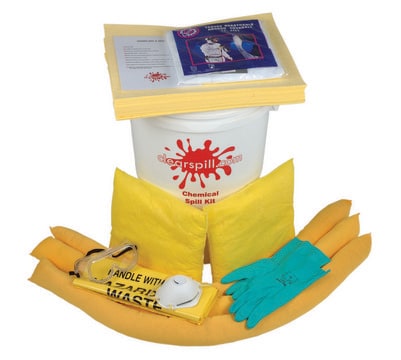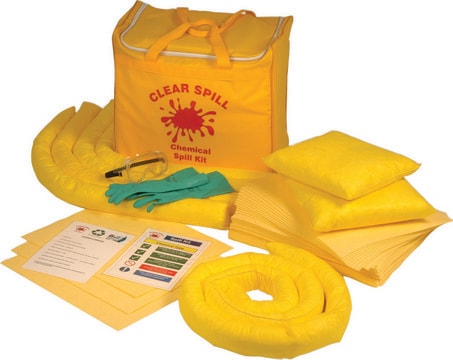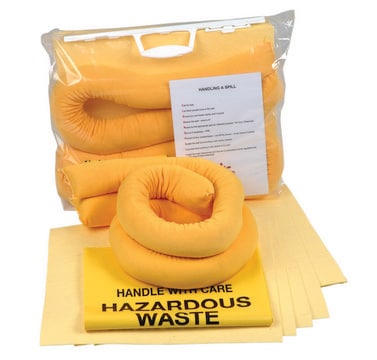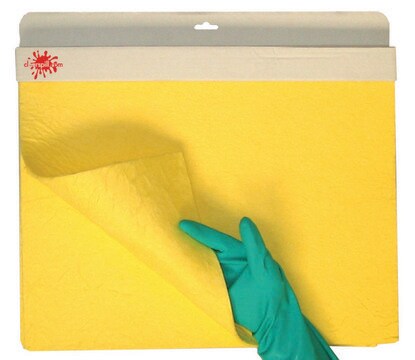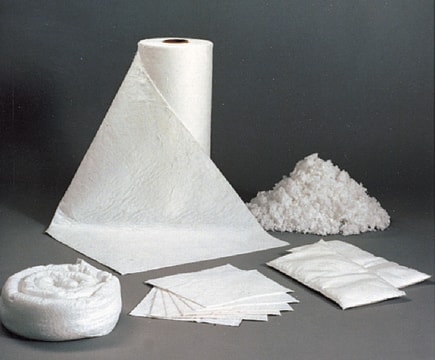Z288500
Aldrich® Imperial mini-spill kits
capacity 3.6 gal (13.6 L)
Sign Into View Organizational & Contract Pricing
All Photos(1)
About This Item
UNSPSC Code:
47131905
NACRES:
NB.35
Recommended Products
capacity
3.6 gal (13.6 L)
Looking for similar products? Visit Product Comparison Guide
General description
Kit contents: ten 12×12 in. universal PP sorbent pads; two 3 in.×4 ft universal socks; one brush/pan kit; one pair nitrile gloves; one 18×30 in. disposal bag; one 5 gal HDPE bucket with lid.
Designed for safely handling the cleanup of small chemical spills in the research laboratory. Kits feature "No Decision Response" universal polypropylene sorbent pads and "socks" that are suited for non-aggressive, hydrocarbon-based, and aggressive liquid leaks or spills.
Kit components are packed in a sturdy HDPE bucket with tight-fitting lid that is used for containment of used sorbents. Spill response instructions are printed on bucket label for fast access.
Caution: Care should be taken when using these sorbents to pick up fuming acids (such as nitric or sulfuric acid), as well as strong oxidizers since they may degrade the polypropylene material.
Kit components are packed in a sturdy HDPE bucket with tight-fitting lid that is used for containment of used sorbents. Spill response instructions are printed on bucket label for fast access.
Caution: Care should be taken when using these sorbents to pick up fuming acids (such as nitric or sulfuric acid), as well as strong oxidizers since they may degrade the polypropylene material.
Legal Information
Aldrich is a registered trademark of Sigma-Aldrich Co. LLC
Choose from one of the most recent versions:
Certificates of Analysis (COA)
Lot/Batch Number
Sorry, we don't have COAs for this product available online at this time.
If you need assistance, please contact Customer Support.
Already Own This Product?
Find documentation for the products that you have recently purchased in the Document Library.
Customers Also Viewed
Y Y Xiao et al.
Epidemiology and infection, 143(9), 1833-1838 (2014-11-02)
No published studies have discussed details of the prognosis and survival of patients with severe avian influenza A(H7N9) infection. In this study we analysed 128 laboratory-confirmed cases of severe H7N9 infection in Zhejiang province, the most affected region during the
Giovanna Trinchese et al.
The Journal of nutritional biochemistry, 26(11), 1136-1146 (2015-06-30)
Different nutritional components are able, by modulating mitochondrial function and gut microbiota composition, to influence body composition, metabolic homeostasis and inflammatory state. In this study, we aimed to evaluate the effects produced by the supplementation of different milks on energy
James Neil Fisher et al.
Oncotarget, 6(15), 13176-13200 (2015-05-12)
SKBR3-cells, characterized by ERBB2/RARA co-amplification, represent a subgroup of HER2+ breast-cancers sensitive to all-trans retinoic acid (ATRA) and Lapatinib. In this model, the two agents alone or in combination modulate the expression of 174 microRNAs (miRs). These miRs and predicted
Mark Zeller et al.
Molecular biology and evolution, 32(8), 2060-2071 (2015-04-11)
The majority of human group A rotaviruses possess the P[8] VP4 genotype. Recently, a genetically distinct subtype of the P[8] genotype, also known as OP354-like P[8] or lineage P[8]-4, emerged in several countries. However, it is unclear for how long
Monique Silvy et al.
Transfusion, 55(6 Pt 2), 1407-1410 (2014-11-22)
The rare amorph Rhnull phenotype is caused by silent alleles at the RH locus and usually arises in consanguineous families. To date, only five molecular backgrounds have been identified in five unrelated families. Subjects with Rhnull red blood cells (RBCs)
Our team of scientists has experience in all areas of research including Life Science, Material Science, Chemical Synthesis, Chromatography, Analytical and many others.
Contact Technical Service